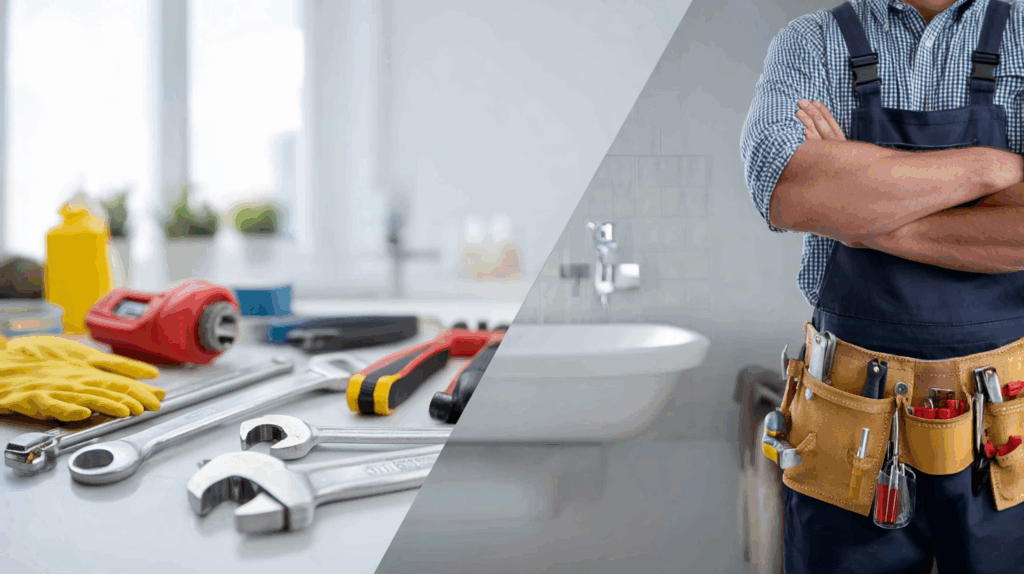Every homeowner faces the same question when plumbing problems arise: “Can I fix this myself, or do I need to call a plumber?” It’s a moment we’ve all experienced – standing in front of a dripping faucet or staring at a clogged drain, wondering whether to grab our toolbox or reach for our phone.
Making the wrong choice can lead to bigger problems and higher costs down the road. Tackle something too complex, and you might turn a simple repair into a major renovation project. But call a professional for every little issue, and your home maintenance budget will disappear faster than water down a drain.
This guide helps you recognize the clear signs you need a plumber versus issues you can confidently handle yourself. Learning to spot the signs you need a plumber saves both money and headaches, giving you the confidence to make smart decisions about your home’s plumbing system.
DIY-Friendly Plumbing Issues: When You Can Handle It
Not every plumbing problem requires professional intervention. Many common household issues fall well within the range of what motivated homeowners can tackle with basic tools and a little patience.
Simple Clogs and Blockages
Most homeowners can successfully handle straightforward blockages that respond to simple intervention. Toilet clogs that clear with a few good plunges, slow bathroom drains that improve with a basic drain snake, and kitchen sinks blocked by visible food debris are all prime candidates for DIY solutions.
The key is that these problems have obvious causes and respond to basic mechanical fixes. If you can see what’s causing the blockage and it clears with reasonable effort, you’re probably dealing with a surface-level issue rather than something deeper in your plumbing system.
Bottom line: If you can see the blockage and it clears with basic tools, you can probably handle it yourself.
Minor Fixture Issues
Many fixture problems stem from worn parts that are designed to be user-replaceable. Dripping faucets need nothing more than a new washer or O-ring. Running toilets usually just need a chain adjustment or flapper replacement. Loose toilet handles, squeaky hinges, and basic caulking around tubs and showers all fall into the “weekend warrior” category.
These repairs share common characteristics: the problem is visible, the fix involves replacing an inexpensive part, and there are clear tutorials available for your specific fixture model.
Key insight: These problems involve replacing inexpensive parts with clear instructions available online.
Routine Maintenance Tasks
Regular upkeep requires no special expertise beyond following basic instructions. Cleaning mineral deposits from aerators and showerheads, replacing toilet flappers, and knowing how to shut off water for minor repairs are valuable skills every homeowner should develop.
These maintenance tasks help prevent bigger problems while building your confidence and familiarity with your home’s plumbing system.
Remember: These skills build confidence while preventing bigger problems down the road.
Success Criteria for DIY Projects
Before diving into any plumbing repair, ask yourself these questions: Is the problem visible and accessible? Can basic tools reach the issue easily? Is there minimal risk of water damage if something goes wrong? Are there clear, step-by-step tutorials available for your exact problem?
If you can answer “yes” to all these questions, you’re probably looking at a good DIY candidate.
Quick checklist: Visible problem + basic tools + low risk + clear instructions = good DIY candidate.

Clear Signs You Need a Plumber: When to Call the Pros
While many plumbing issues are DIY-friendly, certain problems signal the need for professional expertise. Recognizing these signs early can save you from turning a manageable repair into a costly nightmare.
Water Pressure Problems
When you experience sudden loss of pressure throughout your house, inconsistent hot water temperatures, or multiple fixtures affected simultaneously with no obvious cause like a shut-off valve, you’re dealing with system-wide issues that require professional diagnosis.
These problems point to issues with your main water line, pressure regulator, or water heater that are beyond the scope of typical homeowner repairs.
Warning sign: System-wide issues usually indicate problems beyond typical homeowner repairs.
Leak Detection and Repair
Water stains on walls or ceilings, unexplained increases in your water bill, sounds of running water when nothing is in use, or wet spots appearing in your yard or near your foundation all point to hidden leaks that can cause serious structural damage if not addressed promptly.
Professional leak detection requires specialized equipment to locate problems behind walls or underground. According to the EPA, household leaks can waste nearly 10,000 gallons of water annually, making early professional intervention a smart investment. For complex water leak problems, hiring plumbers offering specific residential plumbing services like leak detection makes a difference; they have specialized tools and expertise to locate and repair hidden issues before they cause extensive damage.
Critical point: Hidden leaks can cause serious structural damage if not addressed quickly.
Drain and Sewer Issues
Multiple drains backing up simultaneously, sewage odors coming from drains, water backing up into basement floor drains, or gurgling sounds from multiple fixtures throughout your home indicate problems with your main sewer line or septic system.
These issues can escalate quickly from inconvenient to hazardous, requiring both specialized tools and knowledge of local building codes for proper resolution.
Red flag: Multiple affected drains usually mean main line problems, not individual fixture issues.
Water Heater Warning Signs
No hot water or wildly inconsistent temperatures, unusual noises from your water heater, water pooling around the unit, or rusty and discolored hot water coming from your taps all signal potential water heater problems that can involve both plumbing and electrical or gas connections.
Water heaters are complex appliances that combine plumbing, electrical, and sometimes gas systems, making them unsuitable for most DIY repairs.
Important: Water heaters combine plumbing, electrical, and sometimes gas systems – definitely professional territory.
Emergency Situations
Burst pipes, major leaks, complete loss of water flow to your house, sewage backup in living areas, or gas smells near your water heater or other appliances require immediate professional attention.
These situations pose risks to both your property and your family’s safety, making quick professional response essential to prevent further damage.
Take action immediately: These situations pose risks to both property and family safety.
Complex Installation Needs
New fixture installations requiring permits, pipe rerouting or major modifications, whole-house filtration systems, and appliance connections requiring new water lines all involve work that must meet local building codes and safety standards.
When dealing with water heater issues, gas connections or complex heating system integration for your home, hiring a professional residential plumber ensures the work meets safety codes and protects your home’s systems long-term. The Plumbing-Heating-Cooling Contractors Association emphasizes that proper installation prevents costly repairs and safety hazards down the road.
Code compliance matters: Permits and safety standards exist to protect your home and family.
Making the Right Decision: Your Assessment Framework
When you’re standing in front of a plumbing problem, use this simple three-question test to guide your decision-making process.
The Three-Question Test
Safety Risk: Could this problem cause injury, property damage, or health hazards? If there’s any chance of electrical shock, gas exposure, or structural damage, call a professional immediately.
Complexity Level: Do you have the right tools and a clear understanding of the fix? If the repair requires specialized equipment or involves systems you don’t understand, professional help is the safer choice.
Cost of Mistakes: What happens if your DIY attempt makes the problem worse? If a failed repair could lead to flooding, property damage, or the need for more extensive repairs, the potential savings aren’t worth the risk.
When in Doubt, Get Professional Input
Many plumbers offer free estimates or phone consultations that can help you understand whether a problem is within your skill range. A professional assessment can actually save money by preventing bigger problems and giving you the confidence to tackle appropriate repairs yourself. Some issues that appear simple on the surface have underlying causes that require professional diagnosis and repair.
Red Flag Situations (Always Call Professionals)
Never attempt DIY work involving gas lines or main water connections. Problems affecting multiple areas of your house, issues requiring permits or code compliance, and any situation where you’re unsure about shutting off water or power should always be handled by licensed professionals.
Building Your Professional Relationships
Establish relationships with trusted contractors before emergencies arise. Ask neighbors and friends for recommendations, verify licensing and insurance before hiring anyone, and keep contact information easily accessible for urgent situations.
Having a go-to professional you trust makes the decision-making process much easier when problems arise.

Protecting Your Home Through Smart Decisions
Recognizing the signs you need a plumber versus situations you can handle yourself empowers you to take the right action at the right time. This knowledge protects both your home and your budget by ensuring problems get addressed appropriately before they escalate.
Remember that good professionals want to help you learn and understand your home’s systems, not just sell you services. Building relationships with trusted experts while developing your own basic skills creates the best possible approach to home maintenance.
Whether you’re reaching for your wrench or your phone, you can feel confident that you’re making the smart choice for your home and family. Recognizing these signs you need a plumber helps you take action at the right time, every time.

